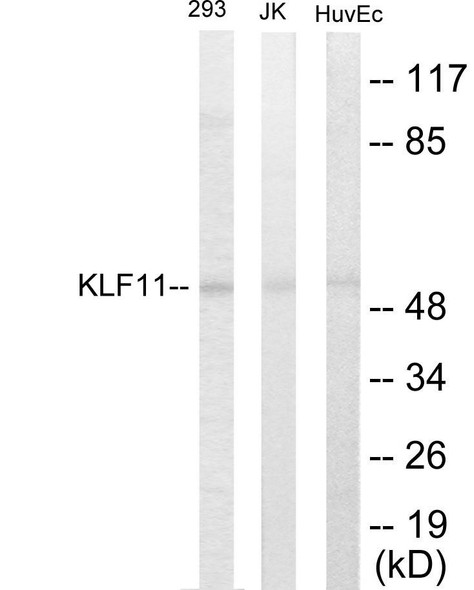Description
| Antibody Name: | KLF10/KLF11 Antibody (PACO05209) |
| Antibody SKU: | PACO05209 |
| Size: | 50ug |
| Host Species: | Rabbit |
| Tested Applications: | ELISA, IHC |
| Recommended Dilutions: | ELISA:1:5000, IHC:1:100-1:300 |
| Species Reactivity: | Human, Mouse, Rat |
| Immunogen: | Synthesized peptide derived from the C-terminal region of human TIEG-1/2. |
| Form: | Liquid |
| Storage Buffer: | Liquid in PBS containing 50% glycerol, 0.5% BSA and 0.02% sodium azide. |
| Purification Method: | The antibody was affinity-purified from rabbit antiserum by affinity-chromatography using epitope-specific immunogen. |
| Clonality: | Polyclonal |
| Isotype: | IgG |
| Conjugate: | Non-conjugated |
| Synonyms: | KLF10; TIEG; TIEG1; Krueppel-like factor 10; EGR-α; Transforming growth factor-β-inducible early growth response protein 1; TGFB-inducible early growth response protein 1; TIEG-1; KLF11; FKLF; TIEG2; Krueppel-like factor 11; Transfor |
| UniProt Protein Function: | KLF10: Transcriptional repressor involved in the regulation of cell growth. Inhibits cell growth. Binds to the consensus sequence 5'-GGTGTG-3'. Belongs to the Sp1 C2H2-type zinc-finger protein family. 2 isoforms of the human protein are produced by alternative splicing. |
| UniProt Protein Details: | Protein type:Transcription factor; C2H2-type zinc finger protein; DNA-binding Chromosomal Location of Human Ortholog: 8q22.2 Cellular Component: nucleus Molecular Function:protein binding; metal ion binding; transcription factor activity Biological Process: circadian rhythm; transcription, DNA-dependent; positive regulation of osteoclast differentiation; somatic stem cell maintenance; negative regulation of transcription from RNA polymerase II promoter; cellular response to starvation; regulation of circadian rhythm; bone mineralization; cell proliferation; negative regulation of cell proliferation; cell-cell signaling; transforming growth factor beta receptor signaling pathway; negative regulation of transcription, DNA-dependent; skeletal development |
| NCBI Summary: | This gene encodes a member of a family of proteins that feature C2H2-type zinc finger domains. The encoded protein is a transcriptional repressor that acts as an effector of transforming growth factor beta signaling. Activity of this protein may inhibit the growth of cancers, particularly pancreatic cancer. Alternative splicing results in multiple transcript variants. [provided by RefSeq, Jun 2013] |
| UniProt Code: | Q13118 |
| NCBI GenInfo Identifier: | 11387050 |
| NCBI Gene ID: | 7071 |
| NCBI Accession: | Q13118.1 |
| UniProt Secondary Accession: | Q13118,O75411, Q503B2, A8MVH0, B2R794, L0R4P6, L0R679 |
| UniProt Related Accession: | Q13118 |
| Molecular Weight: | 480 |
| NCBI Full Name: | Krueppel-like factor 10 |
| NCBI Synonym Full Names: | Kruppel-like factor 10 |
| NCBI Official Symbol: | KLF10 |
| NCBI Official Synonym Symbols: | EGRA; TIEG; TIEG1; EGR-alpha |
| NCBI Protein Information: | Krueppel-like factor 10; early growth response-alpha; zinc finger transcription factor TIEG; TGFB-inducible early growth response protein 1; transforming growth factor-beta-inducible early growth response protein 1 |
| UniProt Protein Name: | Krueppel-like factor 10 |
| UniProt Synonym Protein Names: | EGR-alpha; Transforming growth factor-beta-inducible early growth response protein 1; TGFB-inducible early growth response protein 1; TIEG-1 |
| Protein Family: | Krueppel-like factor |
| UniProt Gene Name: | KLF10 |
| UniProt Entry Name: | KLF10_HUMAN |






